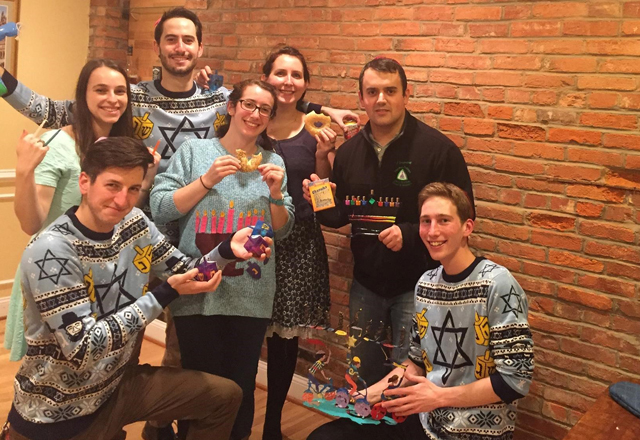Over 3,000 years old, Judaism is one of the oldest monotheistic religions. Calling oneself a Jew draws on a rich history and a continually growing set of religious texts; it is a link to a culture of resilience and a peoplehood that have withstood incredible persecution and social restriction, immigration and assimilation. Thus, for many, being Jewish is much more than having a certain faith tradition.
In the early 1900s, Jewish students filled almost half of medical school spots in America. Although the religious composition of medical students has since shifted, there remain strong sentiments in the Jewish religion that encourage careers in medicine. Judaism defines the human body as sacred; learning how to heal it is viewed as tantamount to “doing God’s work” by preserving another human’s life. Ilan Caplan, a second-year medical student, described how his faith compels him to one day become a family physician: “[The body] is the vessel that God has given souls to walk around in. Therefore, to try to keep the body as healthy as possible is itself a holy act.”
Being a Jewish practitioner in medicine can also confer a responsibility towards social justice. A large part of how Zackary Berger, M.D., Ph.D., conceives his work as a physician is through advocacy and political work. “There is a prophetic ethical tradition of trying to improve the world,” he notes. For example, in Exodus (one of the books of the Torah), the prophet Moses writes of how God says, “I will bring you [the Jews] out from under the yoke of the Egyptians. I will free you from being slaves to them.” The theme of freedom from slavery underlies Passover, one of the major Jewish holidays.
![quote: [The body] is the vessel that God has given souls to walk around in. Therefore, to try to keep the body as healthy as possible is itself a holy act.](https://biomedicalodyssey.blogs.hopkinsmedicine.org/files/2017/04/judaism-medicine-quote-2.jpg) This responsibility toward the other similarly motivates Maya Siegel, a third-year medical student. When asked about how her religious beliefs influence her decision to pursue a career in medicine, Siegel responded, “Social medicine and systems of injustice affect our patients... I am also motivated by Tikkun Olam, the concept that the world was created imperfect, and we as humans are required to work to make the world better.” Compelled by the importance of tradition, ritual and community in the lives of her Jewish peers, Siegel is active in the Jewish Students Association at the Johns Hopkins University School of Medicine as well as in the local Jewish community in Baltimore.
This responsibility toward the other similarly motivates Maya Siegel, a third-year medical student. When asked about how her religious beliefs influence her decision to pursue a career in medicine, Siegel responded, “Social medicine and systems of injustice affect our patients... I am also motivated by Tikkun Olam, the concept that the world was created imperfect, and we as humans are required to work to make the world better.” Compelled by the importance of tradition, ritual and community in the lives of her Jewish peers, Siegel is active in the Jewish Students Association at the Johns Hopkins University School of Medicine as well as in the local Jewish community in Baltimore.
Eric Weaver, a second-year medical student, also feels a deep connection with the rituals and traditions of Judaism; however, his personal practices have more recently been influenced by an affinity with Buddhism, and especially the practice of meditation. Rather than being unable to reconcile the two religions, Weaver points to the rare openness that Judaism has toward other ideas and beliefs. In fact, it is important to note that calling oneself Jewish doesn’t necessitate a belief in the existence of God or the divine; rather, Judaism is, in general, more interested in the “practice” of religion (e.g. rituals, tradition). Weaver finds that his current identity lies in a delicate interweaving of the anchoring and focus of Buddhism, the culture and traditions of Judaism, and the value placed on kindness and love in both.
With regards to incorporating his faith in his medical practice, Berger chuckles when he shares that wearing his yarmulke (a cap that sits on the crown of the head) is often a conversation starter for patients to ask questions about his religious identity. In general, he urges us to see religion not as an outlandish practice but as common and important to the lives of others. “Understanding a patient’s religion is understanding their spiritual needs. It is an important part of interacting with every patient.”
About this series:
Although medicine is often seen as a field that is distinct from religion, religious beliefs have a significant impact on the way physicians and medical students approach their training, interactions with patients, and understandings of disease and death. Biomedical Odyssey bloggers Rabia Karani and Stephanie Zuo have created a short blog series on faith and medicine to give you a glimpse into the worlds of Johns Hopkins students who have been influenced strongly by and/or are actively practicing their faiths.
We hope that you come away with a deeper understanding of the profound impact and immense strength that arises when peoples of faith seek to do good work in the medical field with all their hearts, minds and souls.
Related Content
- Learn more about spiritual services available through The Johns Hopkins Hospital.
- Visit our Office of Diversity and Cultural Competence to learn about overcoming unconscious bias and more.
- Learn more about the Johns Hopkins Jewish Student Association.
- Read more blog posts from our Faith and Medicine blog series
